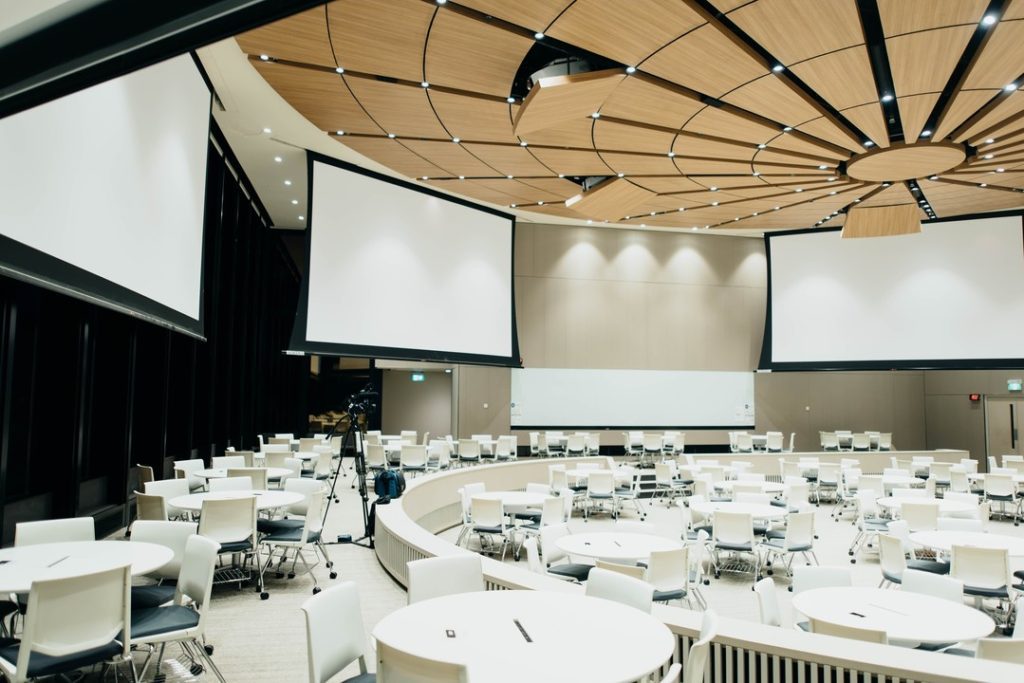We’ve all been there. You’re preparing for an upcoming presentation at work and you notice an old, familiar, obsolete connection and panic mode sets in. “How will I connect my laptop to present my slides? … I don’t have an adapter for this dinosaur.”
Technology continues to evolve at a rapid pace and it’s important to identify when an upgrade may be necessary. Here are a few ways to recognize that your systems need upgrade.
How aged is your equipment?
The simplest way to identify if new equipment is necessary is to recognize the “age” of your current equipment. By age, we are not referring to actual amount of time you have owned the pieces of equipment, but rather the period of the system’s comprehensive technology, relative to the pace of technical change.
In today’s market, AV technology has roughly a five-year window of relevance and symmetry with the most common formats of signal type, resolution, and software. The most remembered and impactful transition happened when technology moved away from analog connections (VGA) to digital (HDMI). Inside this digital matrix of signal formats and connection options, there is an ever-changing world of choices and new versions. It’s not hard to see that another transition is always right around the corner… from HDMI to mini-display port, or to lightning, or USB-C… or to what we can’t even see coming, yet.
Due to this endless and advancing trend, it doesn’t matter if your AV system and its various connections were purchased yesterday and seem technically “new,”; the hard to swallow reality is that they may soon be outdated, and already require imminent planning for upgrade.
Check for clues.
Are you experiencing equipment failures (fans or power supplies breaking down)? Are you spending extra time before each meeting to locate and configure quirky adapters and dongles? Do more and more of your team members now work remotely, because it’s a painful experience to be in the office using the systems there? Have you noticed that the quality of AV equipment in your office is noticeably less than what exists in your own home?
All these should act as telltale signs that it’s time for upgrade.
Ideally, it would be best to avoid this reactionary cycle altogether. If you’re experiencing these symptoms now, then you’re already behind the curve. The best model for ensuring technical relevance, is to proactively plan with scheduled milestones of evaluation; analyzing organizational needs, assessing relevance, and preparing prudent budgets to keep technology efficient and effective for your business’s needs.
What to expect after upgrading.
Upgrading to maintain technical significance can be even more beneficial than just making your presentations look better and run smoother. Keeping equipment fresh and up-to-par with new advancements can lead to improved company culture and showcase a workplace prepared and primed for recruiting the best industry talent. Current employees view new, updated systems as a sign of appreciation and investment toward their work and the value of their daily role. Upgraded AV systems also make a lasting impression with clients, letting them know your organization is a dynamic, focused, planful, up-to-date partner.
Best practices to stay ahead of technology.
To best prepare for the inevitable and rapidly accelerating evolution of technology, it’s essential to create an AV roadmap and budget plan. Mindfulness of upgrade windows planned well ahead of time, ensures that when the need for change hits, the funds will be available. Tracking and adapting these plans with flexibility, prepared for dynamic transitions and advancements, lifecycle is the best practice to keep pace and peace. You should be aware of closed systems, software, or solutions that mandate special requirements, as those items will often need attention the quickest, having to be holistically replaced when outdated and obsolete.
While all of the tips above can help keep you aware of potential upgrades, the simplest solution is building a trusted partnership with a knowledgeable and forward-focused AV provider. AV experts, such as AV-Tech, are often able to anticipate needs that you may not notice or see coming. AV specialists can evaluate, strategize, design and engineer more optimally, knowing the environment, use-case needs, and your long-term plan.
Contact us today to discuss how our services can better equip you for the evolution ahead.



